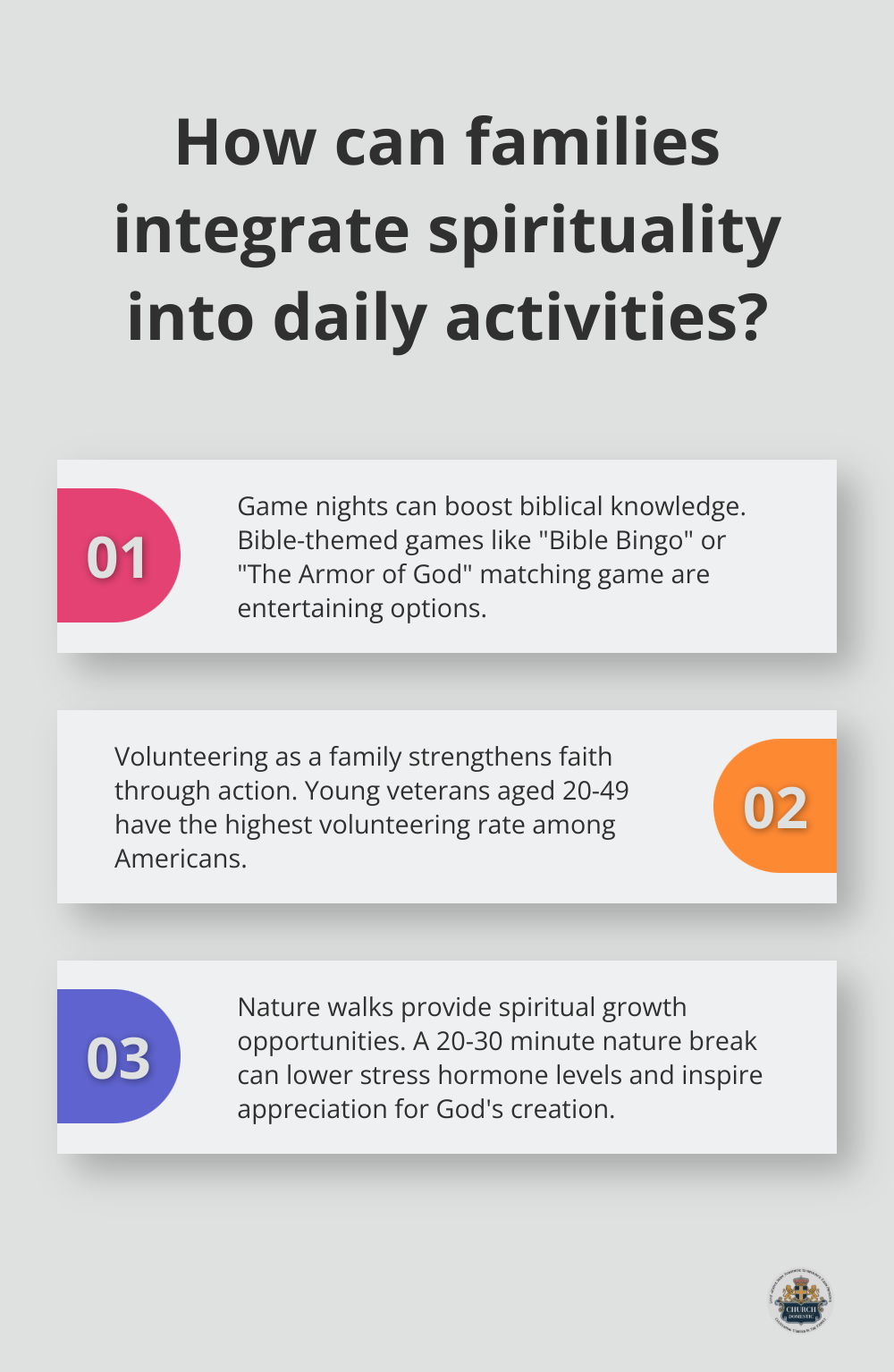At Church Domestic, we understand the importance of nurturing spiritual habits within the home. In today’s fast-paced world, creating a strong foundation for faith can be challenging.
This guide offers practical strategies to help families cultivate healthy spiritual practices in their daily lives. From setting up sacred spaces to integrating faith into family activities, we’ll explore simple yet effective ways to strengthen your spiritual connection at home.
How to Create a Sacred Space at Home
Creating a sacred space at home can transform your spiritual life. A dedicated area for prayer and reflection often deepens faith connections and enhances family dynamics.
Choose Your Space Wisely
Select a quiet corner of your home. You don’t need an entire room; even a small nook will suffice. The key is consistency and accessibility.
Personalize Your Sacred Space
Make your space meaningful by adding objects that resonate with your faith. This could include a family Bible, cherished religious artwork, or heirlooms passed down through generations.
Keep It Clutter-Free
A tidy spiritual environment is essential. Clutter can distract and hinder your ability to focus during prayer or meditation. Apply this principle to your sacred space to create a calm atmosphere that promotes spiritual growth.
Engage the Senses
Try to incorporate elements that engage multiple senses. A scented candle, soft background music, or a comfortable cushion can enhance your spiritual experience.
Make It Accessible for All
If you have children, ensure the space is child-friendly. Include age-appropriate religious books or simple prayer cards.
A thoughtful, personalized sacred space at home sets the stage for meaningful spiritual experiences. This space should evolve with your family’s needs and spiritual journey. Regular use and care of this area will cement its importance in your daily spiritual routine. Now that you’ve created your sacred space, let’s explore how to incorporate daily spiritual practices into your family life.

Daily Spiritual Rituals for Families
Establishing daily spiritual rituals can transform your family’s faith journey. Consistent practices deepen connections and foster spiritual growth. Let’s explore practical ways to weave spirituality into your daily routine.
Start Your Day with Intention
Start your day with a family devotional. Keep it short – even just 5 minutes can make a difference. Read a Bible verse together and discuss its meaning. For younger children, use illustrated Bible stories. Ask each family member to share one thing they’re grateful for. This simple practice sets a positive tone for the day and cultivates an attitude of thankfulness.

Family devotions play a critical role in fostering spiritual growth and unity within a family. They provide a structured time for families to connect spiritually. Try using a devotional app (like YouVersion), which offers plans tailored for families with children of all ages.
Mindful Mealtimes
Transform mealtimes into opportunities for spiritual nourishment. Before eating, take turns saying grace. Involve children by letting them lead the prayer occasionally. During the meal, discuss faith-related topics or share experiences from the day where you saw God at work.
Studies show that eating dinner together benefits everyone. Children of all ages experience better grades, healthier eating habits, and stronger family bonds. To make this practice engaging, try using conversation starter cards with faith-based questions.
Evening Reflection and Prayer
End the day with a family prayer time. Gather in your designated sacred space and share prayer requests. Ask children to pray aloud, building their confidence in expressing their faith. For variety, try different prayer methods:
- Popcorn prayers: Each person says a short, one-sentence prayer.
- ACTS prayer: Adoration, Confession, Thanksgiving, Supplication.
- Prayer journaling: Write prayers in a family journal, reviewing past entries to see how God has answered.
Consistency is the key to success with these practices. Start small and build these habits over time. As you incorporate these rituals, you’ll likely notice a shift in your family’s spiritual atmosphere. The home becomes a place where faith is lived out daily, not just discussed on Sundays.
Now that you’ve established daily spiritual rituals, let’s explore how to integrate faith into your family’s recreational activities and community involvement.
How to Make Family Time More Spiritual
Family time offers rich opportunities to strengthen spiritual connections. At Church Domestic, we’ve discovered simple, enjoyable activities that can significantly boost your family’s spiritual growth. Here are practical ways to infuse faith into your family time:
Game Nights with a Spiritual Twist
Transform your family game nights into faith-building experiences. Try Bible trivia games like “Bible Bingo” or “Apples to Apples: Bible Edition.” These games entertain and increase biblical knowledge. For younger children, “The Armor of God” matching game teaches important spiritual concepts.

Create your own games too. A “Gratitude Scavenger Hunt” (where family members find and photograph things they’re thankful for) can spark meaningful conversations about God’s blessings.
Serving Together Strengthens Faith
Volunteering as a family powerfully lives out your faith. Young veterans aged 20-49 are reported to have the highest rate of volunteering among all Americans. Start small – volunteer at a local food bank or participate in a community clean-up once a month.
Consider “adopting” an elderly neighbor. Your family can help with yard work, grocery shopping, or simply visiting. This teaches children the value of serving others and shows them how to be Christ’s hands and feet in their community.
Nature Walks as Spiritual Experiences
Nature walks provide excellent opportunities for spiritual growth. A study found that spending 20 to 30 minutes in an outdoor setting where people feel they are interacting with nature can lower stress hormone levels. Use this time to discuss God’s creation and our role as stewards.
Try a “Creation Scavenger Hunt.” Make a list of items to find that represent different aspects of God’s creation – something soft (like moss), something that makes noise (like a bird), or something that changes (like clouds). This activity encourages observation and appreciation of the natural world.
End your nature walks with a family prayer, thanking God for the beauty around you. This practice helps children associate the outdoors with spiritual experiences.
The goal is to make these activities enjoyable and meaningful. Don’t force spirituality – let it flow naturally from your experiences together. As you consistently incorporate these practices, you’ll likely see a deepening of faith and stronger family bonds.
Final Thoughts
Cultivating spiritual habits at home requires intention, consistency, and patience. We explored strategies to create sacred spaces, establish daily rituals, and infuse faith into family activities. These practices form the foundation of a spiritually rich home environment. Families who prioritize their faith often experience stronger bonds, improved communication, and a shared sense of purpose.

Children raised in spiritually active homes tend to develop a more robust moral compass and resilience in facing life’s challenges. At Church Domestic, we believe that a spiritually grounded family is better equipped to navigate life’s ups and downs. You create a legacy of faith that can impact generations to come when you implement these strategies.
Your home can become a sanctuary of peace, love, and spiritual growth. You’ll likely notice a transformation in your family dynamics and individual spiritual lives as you practice these habits. Embrace this journey with open hearts, and watch as your family’s faith flourishes in the nurturing environment you’ve created.